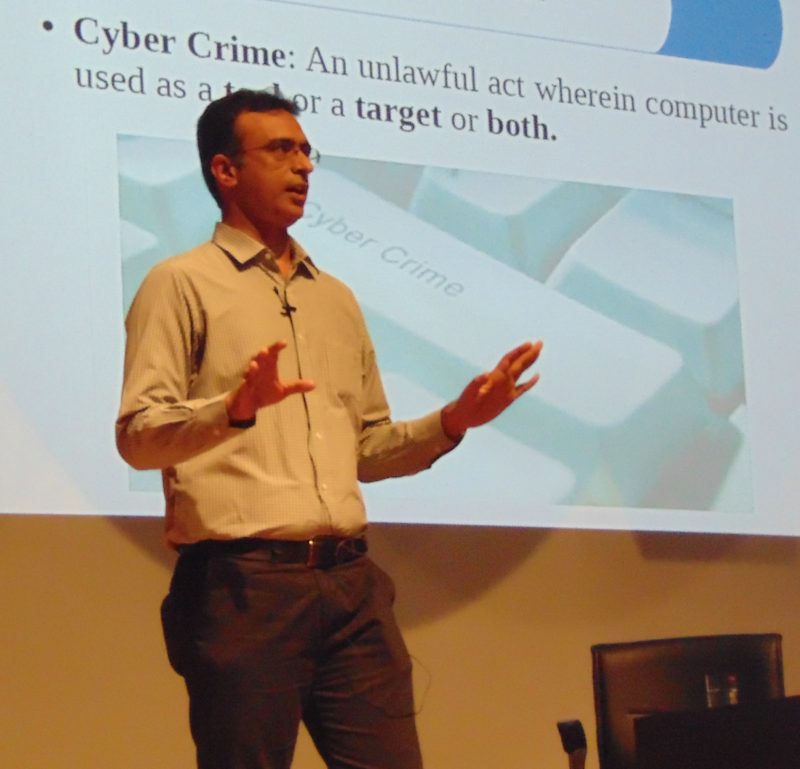As soon as we hear the word Forensics, we immediately connect it with investigation of crimes. Crimes, especially cyber crimes here most of the times involve a computer, a data network, primarily digital devices, and sometimes the IoT. Here, Digital Forensics and IoT Forensics come into play.
To understand Forensics better, and to check if our Indian scheme of things is equipped to handle data investigation at the highest level, Rahul R of Electronics For You spoke to Dr Parag Rughani who is an Assistant Professor at the Institute of Forensic Science, Gujarat Forensics Sciences University (GFSU) in Gujarat.
Q. For better understanding, what is digital forensics?

A. I would like to demystify this concept, Digital Forensics involves investigation of electronic devices to find data that can be used to solve a digital crime. IoT forensics is a branch of digital forensics which deals with IoT related crimes and includes investigation of the connected devices, the sensors as well as the cloud of data.
Q. How has digital forensics penetrated the Digital India Scheme of Things? Do you feel that the facilities here are up to the mark?
A. Firstly, there is a huge demand for Digital Forensics Investigators in India. There is also a huge gap between demand and skilled resources available. As being the world’s only forensic university, GFSU has already taken an initiative and is preparing experts in this domain to take up Digital Forensics as a full-fledged career.
Q. Are there enough number of Digital Forensics facilities in India, for the increasing crime detection, and for research?
A. Only a few of the state Forensic Science Laboratories (FSLs) are equipped with the latest tools and technologies, while those in other states are still dependent on these labs. These FSLs investigate reported crimes as per the requirement. However, as the digital world is changing very quickly and cases related to digital crimes are increasing everyday, there is a huge need of skilled resources for investigation of digital crimes. Apart from reported crimes, there are corporates who have in-house team of investigators to work on the cases internal to the organisations.
Also, to keep pace with latest tools and technologies used by criminals, we need to improve our research facilities for strengthening investigation. So, looking at all the segments we need a lot of Digital Forensic investigators who can take the responsibility of solving cyber crimes, and also researchers who can contribute to this process.
Setting up exclusive cyber police stations at various levels in the country would also help in speeding up cyber crime investigation.
Q. Talking about IoT Forensics and their application in high-profile crimes; how do you think that the technique can be applied?
A. This is one of the fundamental aspects. I have a short answer here, IoT results in interconnection of devices leading to these becoming smart. In case a crime occurs, say from a corporate set-up/organisation, investigators can easily mine data from all connected devices.
Data, thus mined, can then be studied and analysed for user patterns and behaviour. Even minute aspects such as the data & time, location and even the IP address of an IoT connected device can be traced. This is at the device level itself, the data on cloud can also then be mined to validate data at the device level, and therefore a match can be obtained.
Q. If you have studied recent crimes, in Karnataka there was a high-profile case involving a godman wherein a CD was sent for forensic analysis to the laboratory at Hyderabad, how do you see these outsourcing techniques?
A. This happens occasionally. Most of the times cases are investigated at the state FSLs. However, if a case requires multiple opinions or the lab working on the case doesn’t have sufficient resources, help of well equipped FSLs of other states is taken. This is part of a collaborative effort in investigating and solving a crime, which is very important.
Q. Summarising our conversation, how would IoT help in prevention of crimes?
A. With smart sensors and IoT components, we can have a system that can respond quickly to any incident. These sensors can also immediately alert the concerned law authorities without the aid of a human to do so. In fact, this has been a trend from a long time in the western economies.
Q. Finally, what steps would you recommend to handle and reduce cyber-crimes?
A. Firstly, awareness amongst people should increase. The youth should stop becoming victimized. Various organizations should take steps to educate the public on this so that there are no crimes in the first place.
Secondly, the forensic facility and manpower should be strengthened adequately. These are two vital aspects to be followed.












